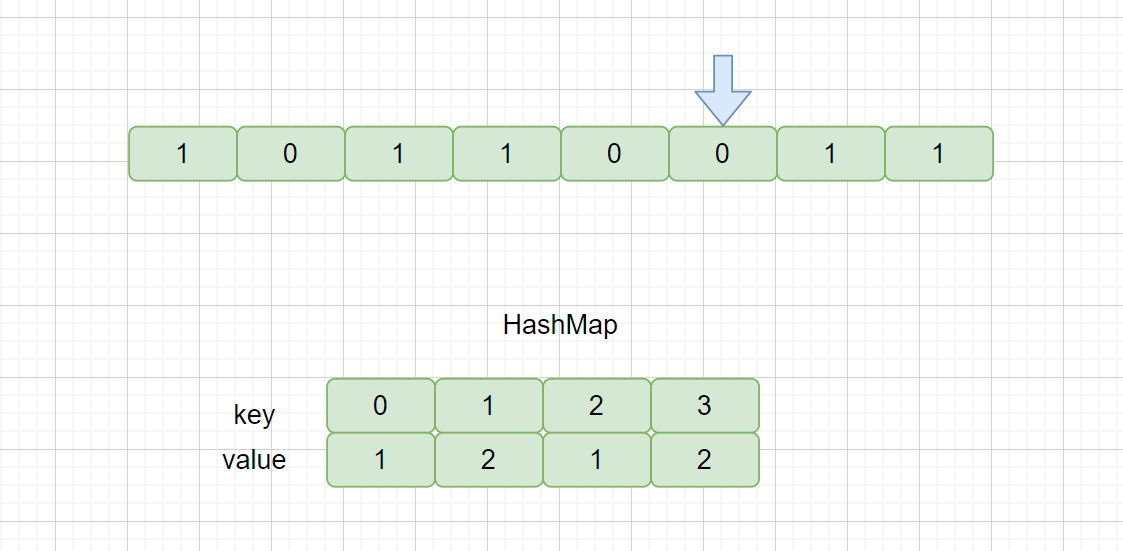> 如果阅读时,发现错误,或者动画不可以显示的问题可以添加我微信好友 **[tan45du_one](https://raw.githubusercontent.com/tan45du/tan45du.github.io/master/个人微信.15egrcgqd94w.jpg)** ,备注 github + 题目 + 问题 向我反馈
>
> 感谢支持,该仓库会一直维护,希望对各位有一丢丢帮助。
>
> 另外希望手机阅读的同学可以来我的 [**公众号:袁厨的算法小屋**](https://raw.githubusercontent.com/tan45du/test/master/微信图片_20210320152235.2pthdebvh1c0.png) 两个平台同步,想要和题友一起刷题,互相监督的同学,可以在我的小屋点击[**刷题小队**](https://raw.githubusercontent.com/tan45du/test/master/微信图片_20210320152235.2pthdebvh1c0.png)进入。
#### [1248. 统计「优美子数组」](https://leetcode-cn.com/problems/count-number-of-nice-subarrays/)
**题目描述**
> 给你一个整数数组 nums 和一个整数 k。
>
> 如果某个 连续 子数组中恰好有 k 个奇数数字,我们就认为这个子数组是「优美子数组」。
>
> 请返回这个数组中「优美子数组」的数目。
**示例 1:**
> 输入:nums = [1,1,2,1,1], k = 3
> 输出:2
> 解释:包含 3 个奇数的子数组是 [1,1,2,1] 和 [1,2,1,1] 。
**示例 2:**
> 输入:nums = [2,4,6], k = 1
> 输出:0
> 解释:数列中不包含任何奇数,所以不存在优美子数组。
**示例 3:**
> 输入:nums = [2,2,2,1,2,2,1,2,2,2], k = 2
> 输出:16
如果上面那个题目我们完成了,这个题目做起来,分分钟的事,不信你去写一哈,百分百就整出来了,我们继续按上面的思想来解决。
**HashMap**
**解析**
上个题目我们是求和为 K 的子数组,这个题目是让我们求 恰好有 k 个奇数数字的连续子数组,这两个题几乎是一样的,上个题中我们将前缀区间的和保存到哈希表中,这个题目我们只需将前缀区间的奇数个数保存到区间内即可,只不过将 sum += x 改成了判断奇偶的语句,见下图。

我们来解析一下哈希表,key 代表的是含有 1 个奇数的前缀区间,value 代表这种子区间的个数,含有两个,也就是nums[0],nums[0,1].后面含义相同,那我们下面直接看代码吧,一下就能读懂。
Java Code:
```java
class Solution {
public int numberOfSubarrays(int[] nums, int k) {
if (nums.length == 0) {
return 0;
}
HashMap map = new HashMap<>();
//统计奇数个数,相当于我们的 presum
int oddnum = 0;
int count = 0;
map.put(0,1);
for (int x : nums) {
// 统计奇数个数
oddnum += x & 1;
// 发现存在,则 count增加
if (map.containsKey(oddnum - k)) {
count += map.get(oddnum - k);
}
//存入
map.put(oddnum,map.getOrDefault(oddnum,0)+1);
}
return count;
}
}
```
C++ Code:
```cpp
class Solution {
public:
int numberOfSubarrays(vector& nums, int k) {
if (nums.size() == 0) {
return 0;
}
map m;
//统计奇数个数,相当于我们的 presum
int oddnum = 0;
int count = 0;
m.insert({0,1});
for (int & x : nums) {
// 统计奇数个数
oddnum += x & 1;
// 发现存在,则 count增加
if (m.find(oddnum - k) != m.end()) {
count += m[oddnum - k];
}
//存入
if(m.find(oddnum) != m.end()) m[oddnum]++;
else m[oddnum] = 1;
}
return count;
}
};
```
但是也有一点不同,就是我们是统计奇数的个数,数组中的奇数个数肯定不会超过原数组的长度,所以这个题目中我们可以用数组来模拟 HashMap ,用数组的索引来模拟 HashMap 的 key,用值来模拟哈希表的 value。下面我们直接看代码吧。
Java Code:
```java
class Solution {
public int numberOfSubarrays(int[] nums, int k) {
int len = nums.length;
int[] map = new int[len + 1];
map[0] = 1;
int oddnum = 0;
int count = 0;
for (int i = 0; i < len; ++i) {
//如果是奇数则加一,偶数加0,相当于没加
oddnum += nums[i] & 1;
if (oddnum - k >= 0) {
count += map[oddnum-k];
}
map[oddnum]++;
}
return count;
}
}
```
C++ Code:
```cpp
class Solution {
public:
int numberOfSubarrays(vector& nums, int k) {
int len = nums.size();
vector map(len + 1, 0);
map[0] = 1;
int oddnum = 0;
int count = 0;
for (int i = 0; i < len; ++i) {
//如果是奇数则加一,偶数加0,相当于没加
oddnum += nums[i] & 1;
if (oddnum - k >= 0) {
count += map[oddnum-k];
}
map[oddnum]++;
}
return count;
}
};
```